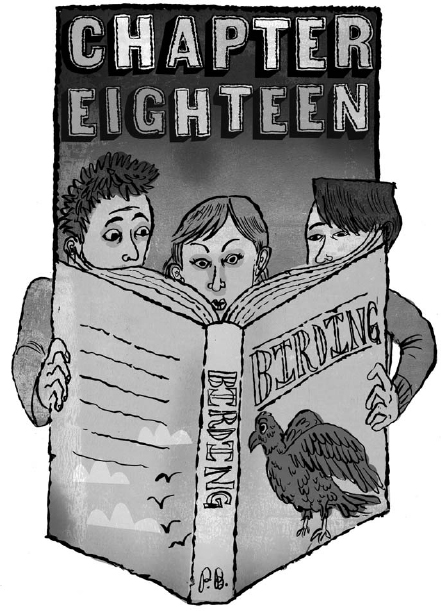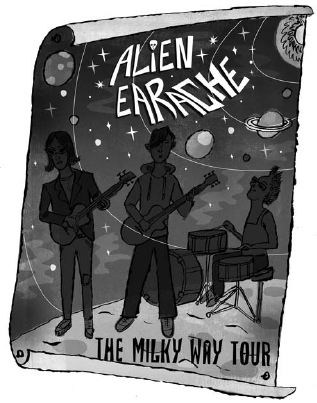This Book Is Not Good For You (11 page)
Read This Book Is Not Good For You Online
Authors: Pseudonymous Bosch

In truth, Yo-Yoji’s mother need not have apologized. Neither Cass nor Max-Ernest had anything to compare this dinner to. And it seemed normal enough to them. That was what was so abnormal about it.
Looking at Yo-Yoji’s family, Cass felt an ache deep in her chest. Part of it, most of it, came from missing her mother. But another part, a buried part, came from missing something she’d never had.
“Have you eaten? Most of the soup wound up on the table, but there’s still a little left—it’s carrot lentil.”
Max-Ernest hesitated. He was hungry. “Um, maybe we could—”
Cass interrupted. “It’s OK, we ate already. Thanks.”
“Is your mother away, Cass?” asked Yo-Yoji’s mother. “She never returned my call yesterday. I need an ally if I’m going to fight all the robo-moms at the PTA.”
On hearing this, Max-Ernest coughed. Cass gave him a quick kick.
“No, she’s just, uh, working all the time,” she said. “Can we talk to Yo-Yoji for a second?”
“Yo-Yoji?” repeated his father, eyebrows raised.
“Didn’t you know? That’s what his friends call him,” said his sister. “He thinks it’s cool.”
Red-faced, Yo-Yoji gave his sister a threatening look, then beckoned his friends out of the room.

Yo-Yoji’s bedroom looked liked it belonged in another house.
Rather than being full of ethnic artifacts, Yo-Yoji’s room was a shrine to popular culture. Rock posters were taped at random all over the walls. On the floor, game consoles and musical instruments were strewn along with discarded pants and T-shirts. The only part of the room that wasn’t cluttered with mess was the illuminated glass shelf that held Yo-Yoji’s carefully arranged sneaker collection.
Max-Ernest pointed to a poster prominently displayed above Yo-Yoji’s desk. “Was that that band you had from when you lived in Japan?”
“Yeah,” answered Yo-Yoji, kicking a purple skateboard out of the way so his friends could get by. “We used to still play together online, but there’s no time anymore…”
The poster showed a picture of Yo-Yoji, guitar in hand, next to two Japanese friends, one with a green Mohawk behind a drum kit, the other with long bleach-blond hair holding a bass guitar. It looked like they were standing on the moon.
Cass studied the poster, impressed. “You guys went on tour? Like doing concerts and stuff?”
Yo-Yoji looked embarrassed. “Kind of, not exactly. I mean we did a couple concerts—but they were in my garage…”

“Oh.” Cass stifled a smile.
“I, um, made the poster myself.”
Yo-Yoji took the news about Cass and the Tuning Fork with considerably more calm and equanimity than Max-Ernest had taken it.
“So, then, that means we’re all good,” said Yo-Yoji.
“What do you mean?” asked Cass, confused.
“You lied to me and Max-Ernest, just like I lied to you guys…”
“You mean about not being in Terces? That was completely different.”
“Why? We were both following instructions. At least my instructions really came from Pietro.”
“Yeah, but you should have trusted us,” said Cass.
Yo-Yoji and Max-Ernest both looked at her.
“OK, fine. I should have trusted you guys, too. We’re all three even,” said Cass. “Can we get started finding my mom now?”
“Wait, but I never lied to anybody!” said Max-Ernest.
“I’m sure you’ll get your chance, yo,” said Yo-Yoji.
Max-Ernest furrowed his brow. He might not have been sure how he was feeling, but if I had to describe his emotional state I might say it was confused, dissatisfied, and slightly resentful.
Within minutes, Yo-Yoji had scanned all the pictures from We and they were examining pixels on his laptop computer.
Apart from the cover photo showing the Skelton Sisters holding a baby, and the two-page picture of them with Ms. Mauvais and the “orphans,” there was one other picture. It showed three grinning boys in gray cloaks holding a long green snake as if it were a pet.
Here is the caption:
Orphans playing with the orphanage’s very own West African Green Mamba. A venomous snake known for its fast speed, the Green Mamba is normally very dangerous. But, according to orphanage officials, this one is quite tame, having been rescued as a baby in the rainforest and raised at the orphanage. *
?
“Do you think you can really tame a snake like that?” asked Max-Ernest skeptically. “They have really small brains.”
“I don’t know,” said Yo-Yoji. “But I know this: if there’s a West African snake, then they’re in West Africa, right? That leaves out East Africa. We narrowed it down to half the continent!”
“Actually, we already knew the plantation was in the Cote d’Ivoire, which is in West Africa, so that’s not really that helpful,” said Cass.
“Oh, right,” said Yo-Yoji, deflated. “Well, what about the rainforest part—does that help?”
“Maybe,” said Max-Ernest. “We could start by figuring out what parts of Cote d’Ivoire have rainforest and go from there. How ’bout that?”
An online search revealed that most of Cote d’Ivoire’s rainforest was in the southeastern parts of the country. However, the rainforest was so large they couldn’t use that information alone to pinpoint the plantation.
“What about the bird in the other picture?” said Max-Ernest. “Maybe it’s like the Northwest Southeast African Go Five Blocks and Turn left Rainforest Parrot or something?”
Yo-Yoji laughed. “That was kind of funny, dude.”
“Really?” Max-Ernest smiled, gratified.
“The bird’s not identified the way the snake was,” said Cass, who was feeling a creeping sense of despair again.
“So maybe we can identify him,” said Yo-Yoji. “My parents have a lot of bird books. They’re into bird-watching and stuff. They call it birding.”
“Birding? That’s weird,” said Max-Ernest. “Like if you collect stamps, you’re stamping. Or if you collect tennis shoes, like you, you’re shoeing—?”
Not bothering to answer, Yo-Yoji zeroed in on the image of the green bird and enlarged it until the bird almost filled the screen.
“His back is to us,” said Cass. “How are we going to identify him from his back?”
“At least we can see he has that really long tail. And look, there’s that yellow Mohawk on the top of his head. That could help.”
“Sure, if he wants to join your band.”
“Ha ha,” said Yo-Yoji, who clearly did not find her joke funny. “Now just a second—”
Yo-Yoji left the room for a minute and returned with a stack of books with names like The Avian Encyclopedia and Hello Birdie and Fine Feathered Friends.
“You weren’t kidding—that’s a lot of bird books,” said Cass.
“Maybe if we just look for African birds in the indexes that would narrow it down,” said Max-Ernest. “How ’bout that?”
This approach made sense to the others, and for over half an hour, they pored over pictures of ostriches and albatrosses, falcons and flamingoes, pelicans and loons. Alas, there were many green birds, but not one with a long tail and a yellow Mohawk.
Getting frustrated, Cass started looking through a book that Max-Ernest had discarded because it was called Birds of the Americas (and thus unlikely to help them identify an African bird).
She froze after flipping only a few pages.
“Hey, guys,” she said slowly. “What if they’re not in Africa at all?”
“What do you mean?” asked Max-Ernest.
“Well, do you think it’s possible Ms. Mauvais would just pretend they were in Africa?”
“You mean like in order to confuse the Terces Society and send us on a wild-goose chase all over the world? Yes. Definitely,” said Yo-Yoji.
“Well, look at this—”
Cass turned the book around so they could see the photograph of the big-eyed bird she’d been staring at. The bird had a red chest and had a yellow crest atop its head. The rest of the bird was bright green. Next to the photo, there was a smaller picture of the bird from behind—showing its exceptionally long tail.
There was no mistaking it: this bird was the bird in We magazine.
“It’s called a quetzal. It’s the national bird of Guatemala,” said Cass, turning the book around to face her again.
“So then they’re in Guatemala?!” Max-Ernest shook his head, thinking about all the time they’d just wasted on African birds.
Cass scanned the rest of the entry on the quetzal. “It says the bird could be anywhere in Central America.”
Yoji typed on the computer, pulling up information on Central America. “So that means they’re in…,” he started reading aloud, “Belize, Costa Rica, El Salvador, Guatemala, Honduras, Nicaragua, or Panama.”
“Great. Now we’re worse off!” Cass groaned. “It was easier when it was just the Cote d’Ivoire.”
“Wait—what about the snake? Why’s there the African snake if they’re in Central America? That doesn’t make any sense,” said Max-Ernest.
The three friends looked at each other in consternation. So much for Central America.
“Hey guys, you see that—?” Yo-Yoji pointed to the computer screen.
He’d just enlarged another section of the snake photo. Faded words were now visible—stenciled on the stucco wall behind the kids holding the snake:
PLEASE DO NOT FEED ANIMALS
And:
MONKEY CAGES

“They must be at a zoo!” said Yo-Yoji. “Or at least a place that used to be one.”
Max-Ernest nodded, excited. “That would explain how there could be a Guatemalan bird and an African snake.”
“Yeah, but we still don’t know where the zoo is,” said Cass. “It could be in Africa or Central America or anywhere.”
“Actually, we know it’s neither of those places,” said Max-Ernest.
Cass looked at him in surprise. “What do you mean?”
“First of all, the signs are in English. Not French or Spanish. And you know what else—see how it says mile, not kilometer? Most countries use metric—besides ours.”
“So they’re not even in Central America, they’re like in… North America?” Cass couldn’t quite absorb the rapid change of locations.
“How ’bout that?”
Yo-Yoji smiled. “Pretty smart.”
Max-Ernest grinned. “Now all we have to do is figure out which zoos are big enough to hide a chocolate plantation.”
“So I guess we might get to go find your mom after all, Cass,” said Yo-Yoji.
Cass nodded, beginning to tear up again—but this time from gratitude, not despair. “Thanks, you guys,” she whispered, feeling in a rush just how lucky she was to have such great friends.
Just then, Yo-Yoji’s little brother walked into Yo-Yoji’s room unannounced. He was balancing three bowls on a tray, and his face was streaked with tears.
“Mom made me make more pudding for everybody, but there wasn’t any more chocolate, so we made vanilla,” he said. “It’s kind of lumpy.”
“Uh, I’m not really hungry,” said Cass, backing away from unappetizing bowls of gelatinous gray gop.
“Me neither, dude,” said Yo-Yoji. “Sorry.”
“Max-Ernest will eat it. He’s not allergic to vanilla,” said Cass.
“Yeah, but what if I don’t… like it?” Max-Ernest protested.
“I told Mom you wouldn’t want it if I made it!”
Starting to cry, Gajin dropped the tray to the floor and ran out of the room. Bowls of pudding splattered on the wall—and all over the shelf of pristine sneakers.
?
~A Clarification~
I’m not anti-vanilla, just pro-chocolate. I wanted to make that clear for all the villains, oops! I’m sorry, I mean vanillains, out there.
You know who you are.